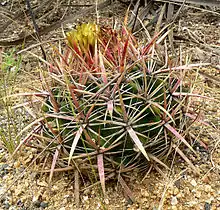Ferocactus viridescens
Ferocactus viridescens is a species of flowering plant in the cactus family Cactaceae. This rare barrel cactus is known by several common names, including coast barrel cactus, keg cactus[3] and San Diego barrel cactus. Most of its native range in the United States is in San Diego County, California, where it is threatened by development, agriculture, and other alterations in its habitat. It is also found in northern Baja California, Mexico.
| Ferocactus viridescens | |
|---|---|
 | |
| Scientific classification | |
| Kingdom: | Plantae |
| Clade: | Tracheophytes |
| Clade: | Angiosperms |
| Clade: | Eudicots |
| Order: | Caryophyllales |
| Family: | Cactaceae |
| Subfamily: | Cactoideae |
| Genus: | Ferocactus |
| Species: | F. viridescens |
| Binomial name | |
| Ferocactus viridescens | |
| Synonyms[2] | |
|
List
| |
It is spherical, oblate, or nearly cylindrical, usually wider than tall, and less than 30 cm (12 in) in height. The flesh is bright green and arranged into several ribs covered in arrays of long spines. The spines, which stick straight out and may curve slightly, are red when new, dulling to gray or tan. The cactus bears yellow to greenish flowers with red or pink scales. The fruit is yellow or red.
The Latin specific epithet viridescens means "turning green".[4]
This plant, which is hardy down to 5 °C (41 °F), must be grown under glass in temperate regions, though it may be placed outside in a sheltered spot in the warm summer months. It has gained the Royal Horticultural Society's Award of Garden Merit.[3][5]
References
- Porter, J.M. (2017). "Ferocactus viridescens". IUCN Red List of Threatened Species. 2017: e.T151890A121512450. doi:10.2305/IUCN.UK.2017-3.RLTS.T151890A121512450.en. Retrieved 13 November 2021.
- "Ferocactus viridescens (Nutt.) Britton & Rose". Plants of the World Online. Board of Trustees of the Royal Botanic Gardens, Kew. 2017. Retrieved 7 December 2020.
- "RHS Plant Selector - Ferocactus viridescens". Retrieved 2 July 2020.
- Harrison, Lorraine (2012). RHS Latin for gardeners. United Kingdom: Mitchell Beazley. p. 224. ISBN 9781845337315.
- "AGM Plants - Ornamental" (PDF). Royal Horticultural Society. July 2017. p. 39. Retrieved 27 February 2018.
